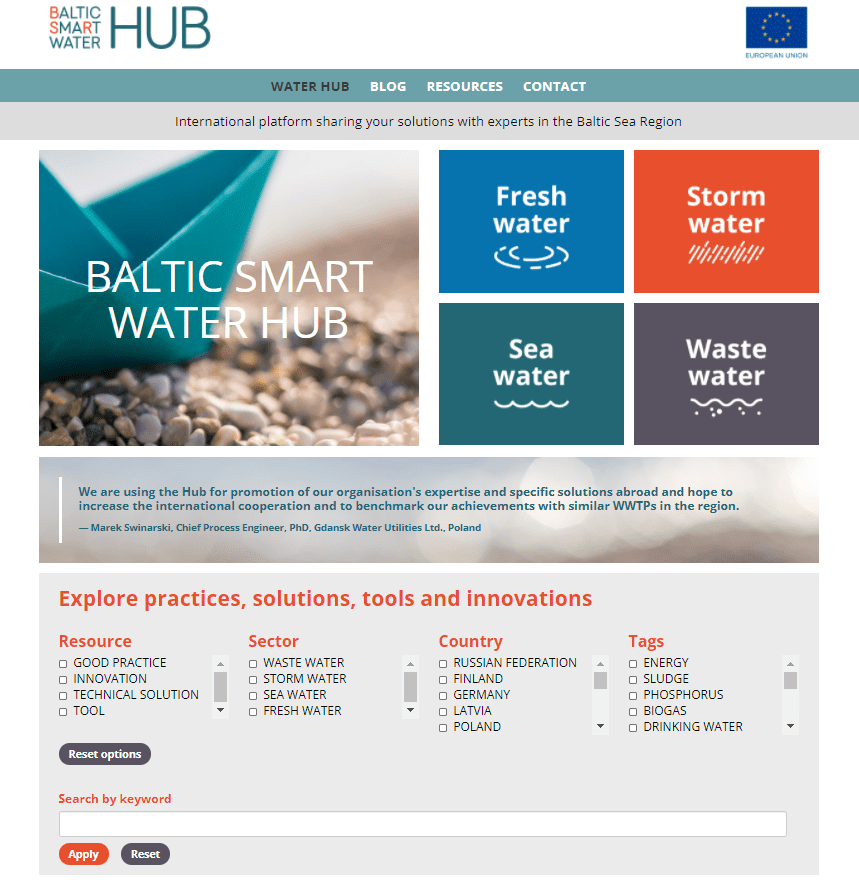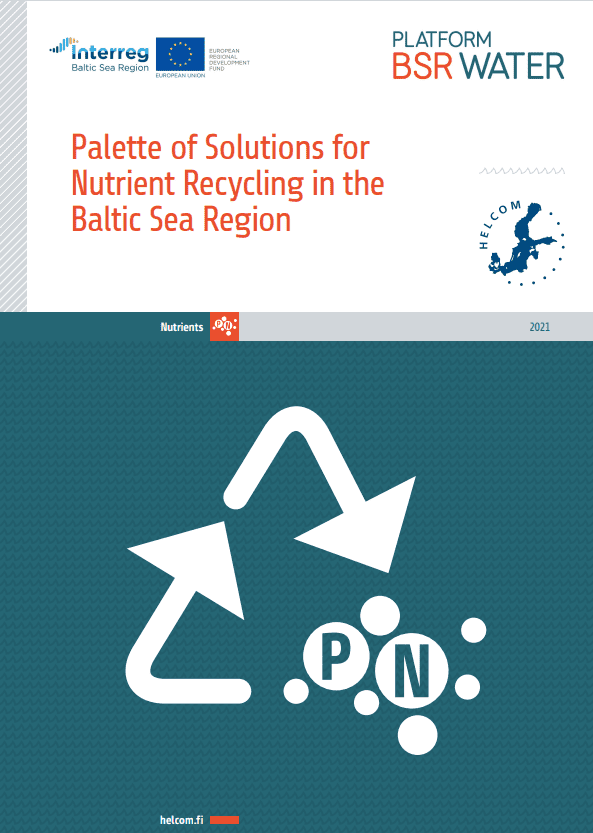BSR WATER
Triggering exchange in the water field
BSR Water aimed to build on existing solutions in order to improve cross-sectoral coordination of smart water management in the Baltic Sea region. It brought together water experts from companies, associations, authorities, academia and NGOs who worked in several cooperation projects before.
A joint platform offered an opportunity to exchange experiences, good practices and tested solutions. In addition, it was about creating a comprehensive overview of the current and future policy contexts and their impacts on the Baltic Sea region.
Baltic Smart Water Hub
One of the core opportunities bringing an existing online platform called Baltic Smart Water Hub to a new level. The open-access web portal promotes good practices, technical solutions and tools developed in different water-related projects in the region. By increasing the portfolio of the hub and a wider dissemination of piloted practices and tools, the platform actively helps help operators smartly manage the water resources of the Baltic Sea region.
Projects represented in the platform
- Interreg Baltic Sea Region: IWAMA | Manure Standards | BEST | VillageWaters | Baltic Blue Growth
- Interreg Central Baltic: NutriTrade | iWater | Blastic | Waterchain
- Interreg South Baltic: Reviving Baltic Resilience
Budgets
in numbers
-
1.13MillionTotal
-
0.77MillionErdf
-
0.12MillionEni + Russia
-
0.00MillionNorway
Achievements
A hub of experts
The BSR WATER project platform provided space for exchanging knowledge, experiences, and best practices for practitioners and decision-makers in water management in the Baltic Sea region. The partners synthesised results and solutions from projects of Interreg Baltic Sea Region, Interreg Europe, Central, and South Baltic as well as the BONUS EU funding programmes. This work resulted in 115 examples of smart water operations, presented in detail in the Baltic Smart Water Hub at www.balticwaterhub.net. These examples include good practices, technical solutions and tools on how to manage fresh, sea, storm and waste waters more efficiently. The platform also enabled to create a lasting network of some twenty-five water experts. These experts and hub partners reached out to more than 6000 practitioners and decision-makers: water companies and associations, local authorities and technology companies, NGOs and water protection foundations from the Baltic Sea region countries.
The Water Hub and the network of water experts continue working after the BSR WATER project platform ends. They enable the exchange of practical experiences and promotion of local achievements on the transnational level. The Water Hub is run by the Sustainable Cities Commission of the Union of the Baltic Cities.
Triggering policy change in the region
The platform significantly contributed to the regional policy dialogue on water-related issues. Based on the knowledge and solutions of the implemented projects, the platform partners developed recommendations on nutrient recycling, management of stormwater and micropollutants in wastewater treatment. They helped develop or update strategic policy documents of the Baltic Marine Environment Protection Commission, known as HELCOM. They cooperated with the coordinators of the EUSBSR policy areas Nutri and Hazards in this policy work.
The palette of solutions for nutrient recycling developed by the partners contributed to the development of the new Baltic Sea Regional Nutrient Recycling Strategy and the revision of the HELCOM Baltic Sea Action Plan. Both strategic documents were adopted at the HELCOM Ministerial Meeting in October 2021.
The partners synthesised the knowledge and solutions on up-to-date organisation of stormwater management in urban landscapes. They promoted this synthesis into the update of the HELCOM recommendation 23/5 on "Reduction of discharges from urban areas by the proper management of storm water systems". It was adopted by the HELCOM Heads of the Delegations meeting. This was a unique case when the project output was integrated into the international policy framework during the project lifetime.
Outputs
Online platform \"Baltic Smart Water Hub\"

The palette of solutions for nutrient recycling in the Baltic Sea region

Project Stories
-
09.09.2020
Interview: “Interreg projects can push into the right direction”
To improve the water quality of the sea has been a continuous objective of Interreg Baltic Sea Region and its predecessor programmes. Many projects have received funding to reduce negative impacts of agriculture on the sea. The platform SuMaNu gathers and synthesises best practices and recommendations on nutrient management. We interviewed Henning Lyngsoe Foged from Aarhus, Denmark, who has been one of the driving forces to spread agri-environmental innovations across countries around the Baltic Sea.Read full story -
14.04.2020
Interview: Better clean the water in your village
People in the countryside release too many nutrients to the environment through their waste water because it is often not purified effectively. This problem was overlooked for many years. The Interreg project Village waters set out to make proper cleaning of waste water common practice across the rural areas around the Baltic Sea. In this interview, the project managers explain why they started the project and what they achieved.Read full story -
21.08.2019
Treating waste water smarter
Waste water treatment plants are transforming from energy consumers to energy producers thanks to new technologies, privatisation of public services and growing resource awareness. The Interreg project IWAMA enables regions and cities to make better use of their limited resources: its Baltic Smart Water Hub makes knowledge about relevant techniques available to plant operators and owners as well as researchers and university lecturers.Read full story -
20.12.2016
Making legal requirement accessible to establish an environmentally friendly aquaculture in the baltic sea
Establishing environmentally friendly mussel aquaculture requires to follow necessary legal obligations in the EU. The project Baltic Blue Growth is making a concerted effort in explaining these requirements to its projects partners and others who are interested in pushing forward mussel aquaculture in the Baltic Sea.Read full story -
30.06.2022
Bridging the gap on sustainable water management in the region
A hub for solutions and a platform for exchange on efficient water management. Read about BSR Water: a successful Interreg project platform that managed to bring water management in the Baltic Sea region to a higher level. All of this was possible thanks to cooperation across borders among 9 countries in our region.Read full story
Partners
Union of the Baltic Cities, Sustainable Cities Commission c/o City of Turku
- TownTurku
- RegionVarsinais-Suomi
- CountryFinland
- RepresentativeBjörn Grönholm
- Phone
- E-Mail
- Web
Baltic Marine Environment Protection Commission - Helsinki Commission (HELCOM)
- TownHelsinki
- RegionHelsinki-Uusimaa
- CountryFinland
- RepresentativeDmitry Frank-Kamenetsky
- Phone
- E-Mail
- Web
Berlin University of Technology
- TownBerlin
- RegionBerlin
- CountryGermany
- RepresentativeMatthias Barjenbruch
- Phone
- E-Mail
- Web
University of Tartu
- TownTartu
- RegionLõuna-Eesti
- CountryEstonia
- RepresentativeMarkus Raudkivi
- Phone
- E-Mail
- Web
Gdansk University of Technology
- TownGdańsk
- RegionTrójmiejski
- CountryPoland
- RepresentativeMagdalena Gajewska
- Phone
- E-Mail
- Web
SYKLI Environmental School of Finland
- TownHelsinki
- RegionHelsinki-Uusimaa
- CountryFinland
- RepresentativeMia O’Neill
- Phone
- E-Mail
- Web
Riga City Council
- TownRiga
- RegionRīga
- CountryLatvia
- RepresentativeLaura Storķe
- Phone
- E-Mail
- Web
City of Helsinki
- TownHelsinki
- RegionHelsinki-Uusimaa
- CountryFinland
- RepresentativeKajsa Rosqvist
- Phone
- E-Mail
- Web
State Geological Unitary Company «Mineral» (SC Mineral)
- TownSt. Petersburg
- RegionCity of St. Petersburg
- Country
- RepresentativeNatalia Bobyleva
- Phone
- E-Mail
- Web
State Autonomous Institution of the Kaliningrad region "Environmental Center "ECAT-Kaliningrad"
- TownKaliningrad
- RegionKaliningrad Oblast
- Country
- RepresentativeOlga Sheshukova
- Phone
- E-Mail
- Web
-
Project managerAgnieszka IlolaUnion of the Baltic Cities
-
Legal representativeTuomas HeikkinenUnion of the Baltic Cities, Sustainable Cities Commission c/o City of Turku
-
Financial managerJussi VälimäkiUnion of the Baltic Cities
-
Communication managerMariia AndreevaUnion of the Baltic Cities



